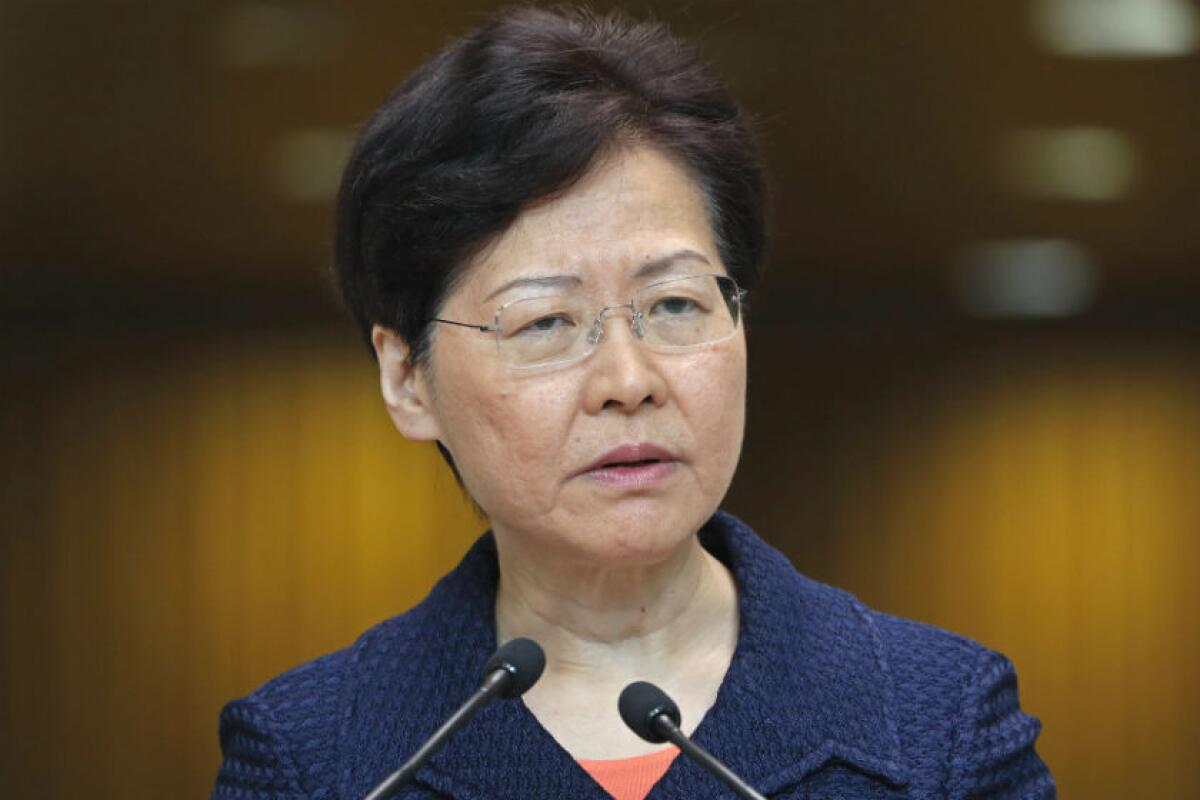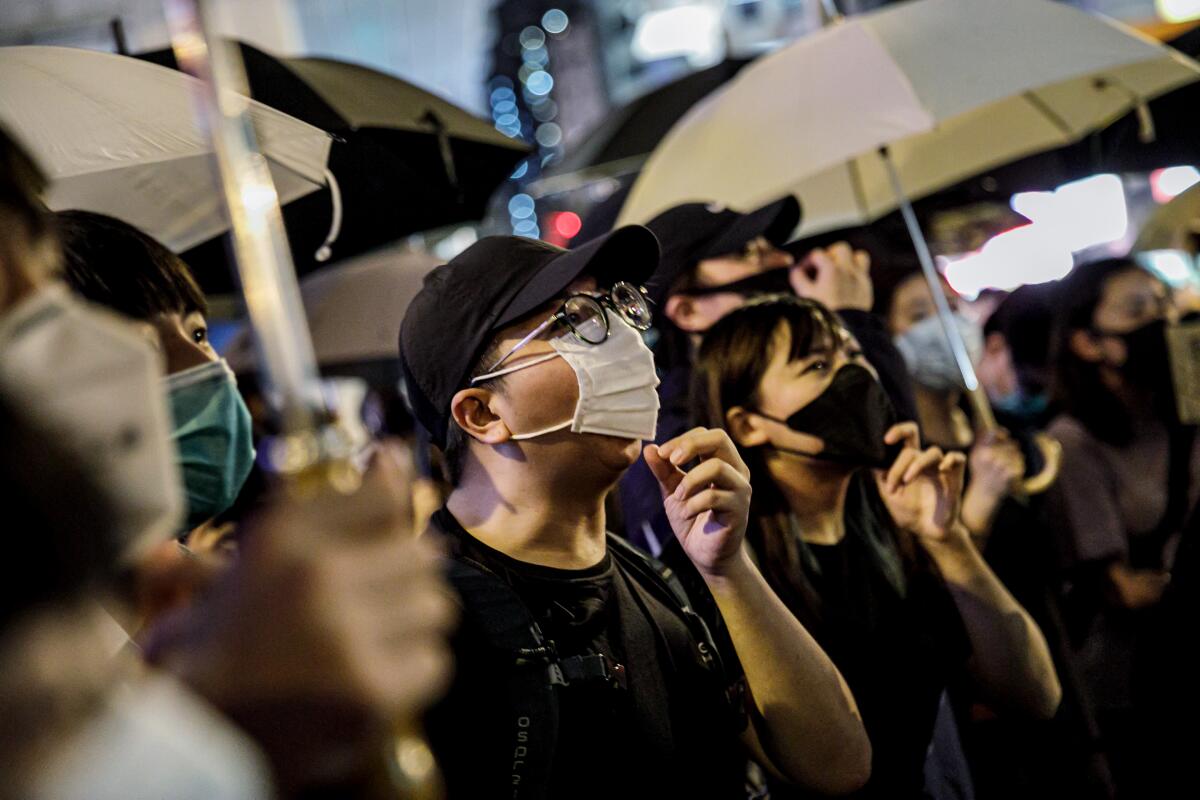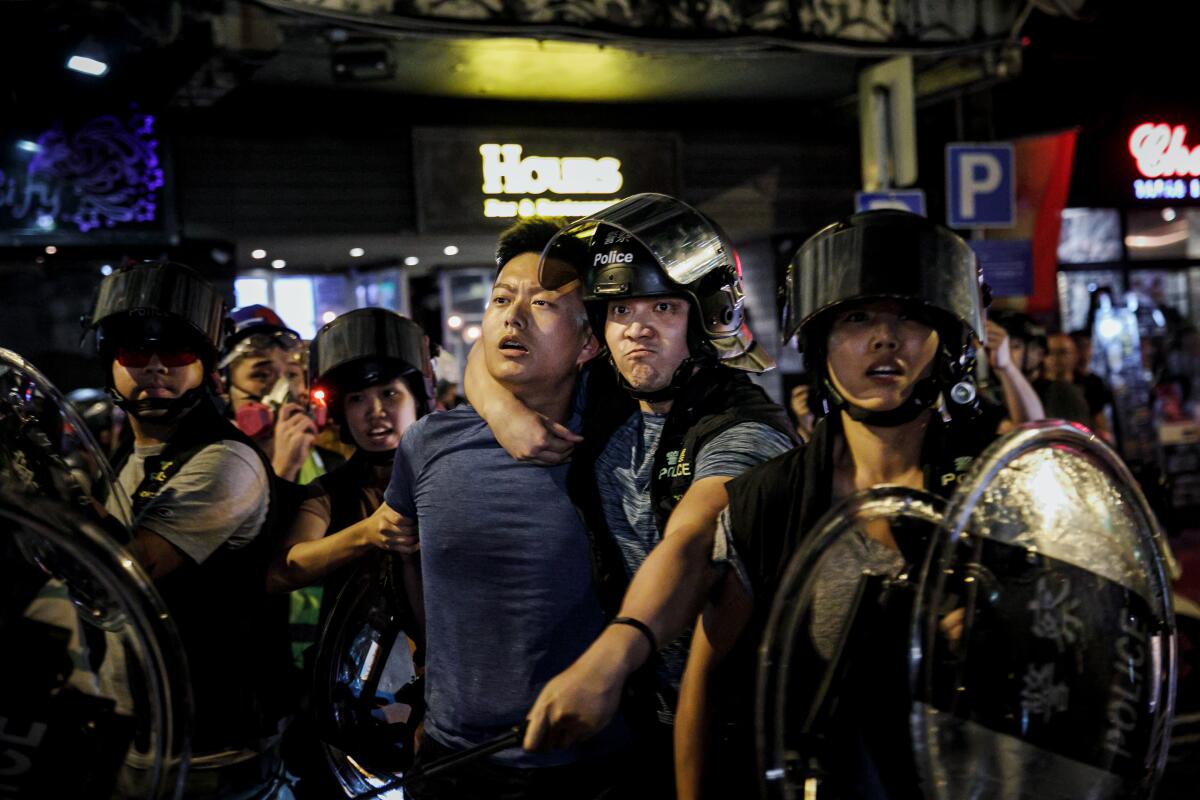One down, four to go, Hong Kong protesters say as the government meets its first demand

- Share via
HONG KONG — Hong Kong Chief Executive Carrie Lam finally uttered the word protesters had been demanding all summer: “Withdraw.”
But after 13 weeks of political crisis, her announcement Wednesday that the government was formally withdrawing the bill that sparked the protest movement may be too little, too late.
Massive but peaceful demonstrations against the legislation — which would have allowed extradition of criminal suspects to China for trial — long ago morphed into increasingly violent clashes with police over a much broader series of demands aimed at curbing the Beijing government’s deepening control over the semiautonomous Chinese territory.
For the protesters, it now appears there is no going back.
Student activist Joshua Wong, who is out on bail after being arrested last week because of involvement in demonstrations, wrote on Twitter that people would not believe the announcement was sincere.
“Whenever there are signs of sending a palm branch, they always come with a far tighter grip on exercising civil rights,” he wrote. “They have conceded nothing in fact, and a full-scale clampdown is on the way.”
Agnes Chow, another recently arrested student activist, wrote on Facebook: “Do not forget the companions we lost, do not forget our comrades who were injured. If we give up, Hong Kong will die.”
The withdrawal of the bill is the first and only government concession to the five key demands of the protesters. The others are an independent inquiry into alleged police brutality, amnesty for arrested protesters, the right of Hong Kong citizens to elect their own political leaders and a government edict against describing the protests as “riots.”
“Five key demands, not one less!” had become a catchphrase of the protest movement.
“We will change our slogan to ‘Four key demands, we will accept nothing less,’ ” pro-democracy legislator Eddie Chu wrote Wednesday on Facebook after Lam’s announcement in a prerecorded television broadcast.
The bill had become a potent symbol of Beijing’s encroachment on the rights of Hong Kong citizens, spurring fears that it would be used to circumvent the territory’s rule of law and freedom of speech.
Lam suspended the bill in mid-June and weeks later declared it “dead.” But critics said that left open a legal possibility of reviving the bill. “Withdraw!” became a rallying cry for the protesters.
For weeks Lam danced around using the term, fueling accusations that she was a tool of Beijing.
Her statement Wednesday was unequivocal: “The government will formally withdraw the bill in order to fully allay public concerns.”
Lam also sought to address growing anger toward Hong Kong’s police, who once called themselves “Asia’s finest” but now, after the arrests of more than 1,000 protesters, are widely seen as collaborators with organized criminal gangs and perpetrators of violence against civilians.
She said she would start a “direct dialogue” with Hong Kong society by reaching out to “people from all walks of life.” She also announced she was adding two new members to a 27-person council created two decades ago to investigate police actions.
The council has been criticized as not being truly independent because it is appointed by the government, which has continued to describe the protesters as “radicals” and denied that police have used excessive force against them. Lam did not agree to demands for a separate, judge-led inquiry into police violence.


The withdrawal of the extradition bill may be an attempt to quell protests ahead of Oct. 1, the 70th anniversary of the People’s Republic of China. Beijing is planning a military parade and national celebration, which Chinese leader Xi Jinping is loath to see marred by political unrest.
Experts predicted that his government would find a way to repress protests by then, though Lam said in an audio recording leaked to Reuters that there is no such deadline and that Beijing has no plans to deploy the People’s Liberation Army in Hong Kong. China maintains a small military garrison in the territory.
The Hang Seng index, a measure of Hong Kong’s stock market performance, reacted favorably to the news of the withdrawal, shooting up almost 4% early Wednesday afternoon amid speculation that Lam might withdraw the bill.
But protesters gave no indication that they intended to back down.
Online, many shared an image from “Winter on Fire” — a documentary about the Ukrainian protests against the pro-Russia government that began in late 2013 — of a man speaking with Chinese captions: “If we accepted the government’s conditions, our friends who’ve already died would not forgive us.”
Others posted images of a man in a yellow rain jacket standing on top of a mall. He was the first of at least six people who have committed suicide in the last three months and left anti-extradition-bill messages behind.
The Civil Human Rights Front, a group that organized marches against the extradition bill, released a statement calling for continued demonstrations.
“After all these months, the cold-blooded heartlessness of authoritarian, violent governance has strengthened our resolve to fight for real universal suffrage,” it said. “We will continue to struggle until the five core demands are wholly fulfilled!”
In a briefing outside the legislative complex Wednesday night after the withdrawal of the bill, two masked members of a group called the Citizens’ Press Conference declared that a “partial victory” was not enough.
“Applying a Band-Aid months later on to rotting flesh simply will not cut it,” said one of the speakers, who gave her name only as Ms. Chen. “We are one demand down and we have four to go. We will not settle for less.”
Government supporters also seemed dissatisfied. Many of the more than 1,500 comments left on the Facebook page of HKG Pao, a pro-government online news outlet, criticized Lam for being “too soft” and a “failure and disappointment.”
Pro-Beijing lawmakers said at a news conference after the announcement that they supported the withdrawal, though it was a late step in resolving the crisis.
“The crisis has been going on for months now and is no longer purely about the bill,” said Starry Lee, chair of the pro-Beijing DAB party.”It’s already quite late for these measures.”
Both sides are braced for more demonstrations.
The next one is scheduled for Saturday at the U.S. Consulate to support the a U.S. bill called the Hong Kong Human Rights and Democracy Act, which would strengthen U.S. backing for democratization and human rights in Hong Kong.
Special correspondent Kilpatrick reported from Hong Kong and Times staff writer Su from Beijing.
More to Read
Sign up for Essential California
The most important California stories and recommendations in your inbox every morning.
You may occasionally receive promotional content from the Los Angeles Times.














